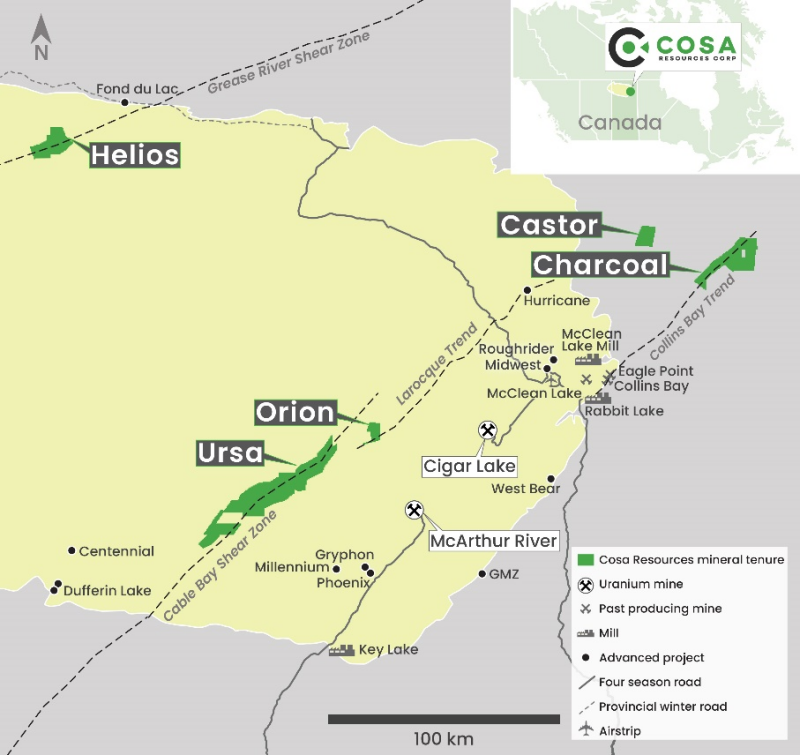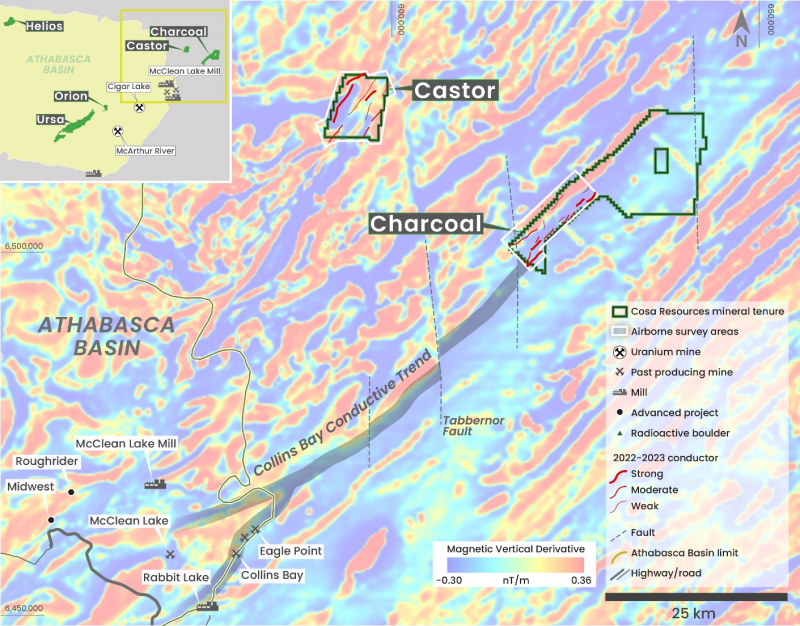Archive
Cosa Reports Geophysical Survey Results from Castor and Charcoal Uranium Projects
 | |||||||||
 |  | ||||||||
Vancouver, British Columbia – TheNewswire - April 20, 2023 – Cosa Resources Corp. (CSE:COSA) (“Cosa Resources” or the “Company”) is pleased to announce the preliminary results of the airborne electromagnetic (EM) surveys recently completed on its 100% owned Castor and Charcoal uranium projects in the Eastern Athabasca Basin region.
Highlights
-
EM conductors confirmed on both properties with more than 50 kilometres total conductive strike length defined
-
Conductors at Charcoal lie along the interpreted northeastern extension of the Collins Bay – Eagle Point conductive trend
-
Conductors at Castor were previously unknown and are located in a zone of structural complexity
Keith Bodnarchuk, President & CEO, commented: “I would like the thank our technical team and the contractors, who, despite facing harsh weather conditions, completed the survey safely and on budget. These results are a success, with the survey outlining previously unidentified structurally complex conductors on Castor and confirming the extension of conductors onto the Charcoal property. We look forward to updating the market about our upcoming summer exploration program on our 100% owned Athabasca Basin land package.”
Andy Carmichael, VP of Exploration commented: “The VTEM™ Plus survey results at Castor and Charcoal confirm that EM conductors, which are associated with all major uranium deposits in the Athabasca Basin region, are present at both properties. We are pleased to have opened up a significant strike length of newly-identified conductors at Castor and mapped the interpreted extension of the Collins Bay – Eagle Point conductive trend at Charcoal. Interpretation of these results is ongoing and next steps are being considered to continue advancing these properties.”
The Survey
Geotech Airborne Geophysical Surveys (Geotech Ltd.) completed 932 line-km of Versatile Time-Domain Electromagnetic (VTEM™ Plus) and Horizontal Magnetic Gradiometer survey over the Castor and Charcoal properties in late 2022 and early 2023. The survey was flown to map EM conductors within the properties. EM conductors are potentially indicative of the presence of graphite- and/or sulphide-bearing basement rocks which are associated with all significant uranium deposits in the Athabasca Basin region.
Charcoal
Regional magnetic and historical EM results suggest the Charcoal property covers the northeast extension of conductive trends associated with the Collins Bay and Eagle Point deposits. The 459 line-kilometres of VTEM™ Plus surveying over the southwestern portion of Charcoal defined more than 27 kilometres of strike length of northeast-trending EM conductors located along the interpreted extension of the Collins Bay-Eagle Point trend, of which more than 20 kilometres are interpreted as moderately to strongly conductive. As the survey covered approximately 25% of the Charcoal property, significant potential remains to define additional conductive strike to the northeast. Figure 2 shows the airborne survey results at Charcoal.
Castor
The Castor property covers a flexure where a prominent magnetic low zone changes orientation from northeast-trending to west-trending. The 473 line-kilometres of VTEM™ Plus surveying completed by Cosa defined more than 27 kilometres of strike length of northeast-trending EM conductors at Castor, over 16 kilometres of which are interpreted to be moderately to strongly conductive. The longest strongly conductive trend is located in the western portion of the project and crosscuts the axis of the magnetic low, suggesting complex folding of conductive basement rocks within the area. No EM conductors were previously known within the property as the most recently airborne EM survey of the area was completed in 1978. Figure 2 shows the airborne survey results at Castor.
Next Steps
Both projects have been upgraded by establishing the presence of prospective EM conductors and additional work is warranted. Following interpretation of the final airborne survey dataset, additional target generation work may include extending VTEM™ Plus coverage over the remainder of Charcoal. Target refinement at both projects may include high-resolution airborne gravity surveys to locate gravity lows potentially related to basement-hosted hydrothermal alteration zones followed by prospecting/ground truthing.
Figure 1 – Cosa’s Eastern Athabasca Portfolio with Prospective Uranium Corridors
Figure 2 – Castor and Charcoal Airborne Survey Results
About Cosa Resources
Cosa Resources is a Canadian mineral exploration company based in Vancouver, BC and is focused on the exploration of its uranium properties in northern Saskatchewan. The portfolio includes five uranium exploration properties: Ursa, Orion, Castor, Charcoal, and Helios, with over 100,000 hectares in the prolific eastern Athabasca Basin.
The team behind Cosa Resources has a track record of success in Saskatchewan, with over a century of combined experience in uranium exploration, discovery, and development in the province.
Qualified Person
The Company’s disclosure of technical or scientific information in this press release has been reviewed and approved by Andy Carmichael, P.Geo., Vice President, Exploration for Cosa Resources. Mr. Carmichael is a Qualified Person as defined under the terms of National Instrument 43-101. This news release refers to neighboring properties in which the Company has no interest. Mineralization on those neighboring properties does not necessarily indicate mineralization on the Company’s properties.
Contact
Keith Bodnarchuk, President and CEO
info@cosaresources.ca
+1 888-899-2672 (COSA)
Cautionary Statements
Neither the Canadian Securities Exchange nor the Market Regulator (as that term is defined in the policies of the Canadian Securities Exchange) accepts responsibility for the adequacy or accuracy of this release.
This news release includes certain “Forward‐Looking Statements” within the meaning of applicable securities laws. When used in this news release, the words “anticipate”, “believe”, “estimate”, “expect”, “target”, “plan”, “forecast”, “may”, “would”, “could”, “schedule” and similar words or expressions, identify forward‐looking statements or information. These forward looking statements or information relate to, among other things: the exploration, development, and production at the Company’s mineral projects.
Forward‐looking statements and forward‐looking information relating to any future mineral production, liquidity, enhanced value and capital markets profile of the Company, future growth potential for the Company and its business, and future exploration plans are based on management’s reasonable assumptions, estimates, expectations, analyses and opinions, which are based on management’s experience and perception of trends, current conditions and expected developments, and other factors that management believes are relevant and reasonable in the circumstances, but which may prove to be incorrect. Assumptions have been made regarding, among other things, the price of metals; no escalation in the severity of the COVID-19 pandemic; costs of exploration and development; the estimated costs of development of exploration projects; the Company’s ability to operate in a safe and effective manner.
These statements reflect the Company’s respective current views with respect to future events and are necessarily based upon a number of other assumptions and estimates that, while considered reasonable by management, are inherently subject to significant business, economic, competitive, political and social uncertainties and contingencies. Many factors, both known and unknown, could cause actual results, performance, or achievements to be materially different from the results, performance or achievements that are or may be expressed or implied by such forward‐looking statements or forward-looking information and the Company has made assumptions and estimates based on or related to many of these factors. Such factors include, without limitation: the Company's dependence on one mineral project; precious metals price volatility; risks associated with the conduct of the Company's mining activities; regulatory, consent or permitting delays; risks relating to reliance on the Company's management team and outside contractors; the Company's inability to obtain insurance to cover all risks, on a commercially reasonable basis or at all; currency fluctuations; risks regarding the failure to generate sufficient cash flow from operations; risks relating to project financing and equity issuances; risks and unknowns inherent in all mining projects; contests over title to properties, particularly title to undeveloped properties; laws and regulations governing the environment, health and safety; the ability of the communities in which the Company operates to manage and cope with the implications of COVID-19; the economic and financial implications of COVID-19 to the Company; operating or technical difficulties in connection with mining or development activities; employee relations, labour unrest or unavailability; the Company's interactions with surrounding communities; the speculative nature of exploration and development; stock market volatility; conflicts of interest among certain directors and officers; lack of liquidity for shareholders of the Company; litigation risk; and the factors identified in the Company’s public disclosure documents. Readers are cautioned against attributing undue certainty to forward‐looking statements or forward-looking information. Although the Company has attempted to identify important factors that could cause actual results to differ materially, there may be other factors that cause results not to be anticipated, estimated or intended. The Company does not intend, and does not assume any obligation, to update these forward‐looking statements or forward-looking information to reflect changes in assumptions or changes in circumstances or any other events affecting such statements or information, other than as required by applicable law.

